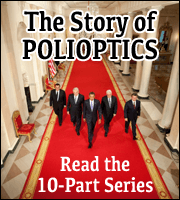Sarah Lyall, and John Harris are our interview guests this week.
Show produced by Katherine Caperton.
Original Air Date: July 23, 2011 on SiriusXM Satellite Radio “POTUS” Channel 124.
Listen to the show by clicking on the bar above.
Show also available for download on Apple iTunes by clicking here.
Back in April, I took a business trip in London that coincided with the  Royal Wedding of Prince William and Kate Middleton — and my appearance on Polioptics that week was all sweetness and light. Now, in July, I’m again in London, but things aren’t so rosy in the British press.
Royal Wedding of Prince William and Kate Middleton — and my appearance on Polioptics that week was all sweetness and light. Now, in July, I’m again in London, but things aren’t so rosy in the British press.
The breathless issues of springtime are now things of the past. No speculation about Kate’s dress. No fawning over Pippa. No, the stars this week — playing in their own horror flick — was Rupert Murdoch and his son, James. If there was an ingenue, it was the spouse of the protagonist, Wendi Deng Murdoch, who we watched on live television leap to her husband’s defense when a would-be attacker approach with a pie tin full of shaving cream. Now that the YouTube video of the quintessentially polioptic moment has over 1.5 million views — the thing’s gone certifiably viral.
[youtube]H3SfSBjo7YE[/youtube]
The News Of The World/News International hacking affair is a story that spans both sides of the Atlantic. It consumes London, obviously, for that city’s overabundance of, and obsession with, “the red tops,” the tabloids that keep politicians and celebrities alike on their toes, with racy photos and, now we know, ill-gotten scoops. But the story is also a whopper in New York and points beyond because News Corporation — from Fox News Channel to 20th Century Fox Film Studios — comprises a major part of America’s media and content diet.
So who better for Adam and I to talk to about all this than correspondent Sarah Lyall, whose New York Times bylines have been a fixture on page one of the Grey Lady in recent weeks? Sarah, an embedded American fully immersed in British culture, still retains her Yankee accent but for many years has had a British husband and two kids who call London home. Sarah is the author of 2008’s The Anglo Files — I love that name — which Publisher’s Weekly said “dissect s British quirks and remarks how peculiar are the inhabitants of that moist little isle.”
s British quirks and remarks how peculiar are the inhabitants of that moist little isle.”
It certainly was a peculiar week in London, and Sarah gives us a front row seat to the Parliamentary proceedings and breaks it down for us, from ink-stained scribes to crooked cops to a Prime Minister revisiting his past appointments in hindsight.
So take a trip with Adam and Josh to Heathrow and check in with all of the polioptic aspects of the still unfolding hacking scandal.
* * *
Returning back over the Atlantic to Washington, Adam and I next talk to the godfather of Politico, Editor-in-Chief John Harris. From before the sun rises, with Mike Allen’s Politico Playbook and Ben White’s Morning Money — among other stories pushed online — to the end of the day, when a cadre of over 100 reporters file their final dispatches, Politico in four short years has upended the Washington media establishment to set the tone and “drive the day” of ensuing coverage.
But it’s what John did after the Clinton Years that’s taken Washington by storm. As part of the small founding team that hatched Politico in 2007, he has changed forever how Washington creates and gets its news. In his conversation with Adam and Josh, he pays homage to his mentors at the Post, executive editors Ben Bradlee and Len Downie, but what’s happened to coverage of the Capitol since Politico burst onto the scene, from a technological standpoint, at least, has easily eclipsed the incremental changes — “now, color photos!” — that spanned decades before.
Was it the piece in Vanity Fair in 2009 by Michael Wolff — “Politico’s Washington Coup” that led with a Gasper Tringale’s photo — in full stride — of Harris, executive editor Jim VandeHei, publisher Robert Allbritton, and chief White House correspondent Mike Allen at Politico’s offices? The motion of the shot made it look like this team was about to draw their guns for a shootout in Tombstone or blast off in the Space Shuttle to do battle with an asteroid in Armageddon.

The Politico Boys, by Gaspar Tringale for Vanity Fair

We were intrigued a few weeks ago to read the news that Politico and Random House would be teaming up to publish 2012 election “E Books” — available on iPads and Kindles, for a price — and wondered what this might portend for the direction that near-real time long-form political journalism may be headed next. Politico is free for everyone who clicks to it. But not so, surely, the manuscript-length projects that will soon be available from Apple’s iBookstore.
In his conversation with Adam and me, John Harris gives further hints about his thinking. He seems to realize that there’s a limit to how many words, and how much attention, the stories on Politico can command. That makes sense, given that they’re usually read on Blackberries while chugging a latte and dashing to the DuPont Circle Metro Station. Where is the time-honored tradition of long-form political journalism, the real narratives about what happens in Washington, going to go? To iPads, certainly, at 20,000-30,000 words a pop. When they do appear next, right after the 2012 election, they’ll have a Politico brand mark on them, and the new found revenue that goes with it.
Have a listen, and see what you think.
And see you next week on Polioptics.



Leave a Reply